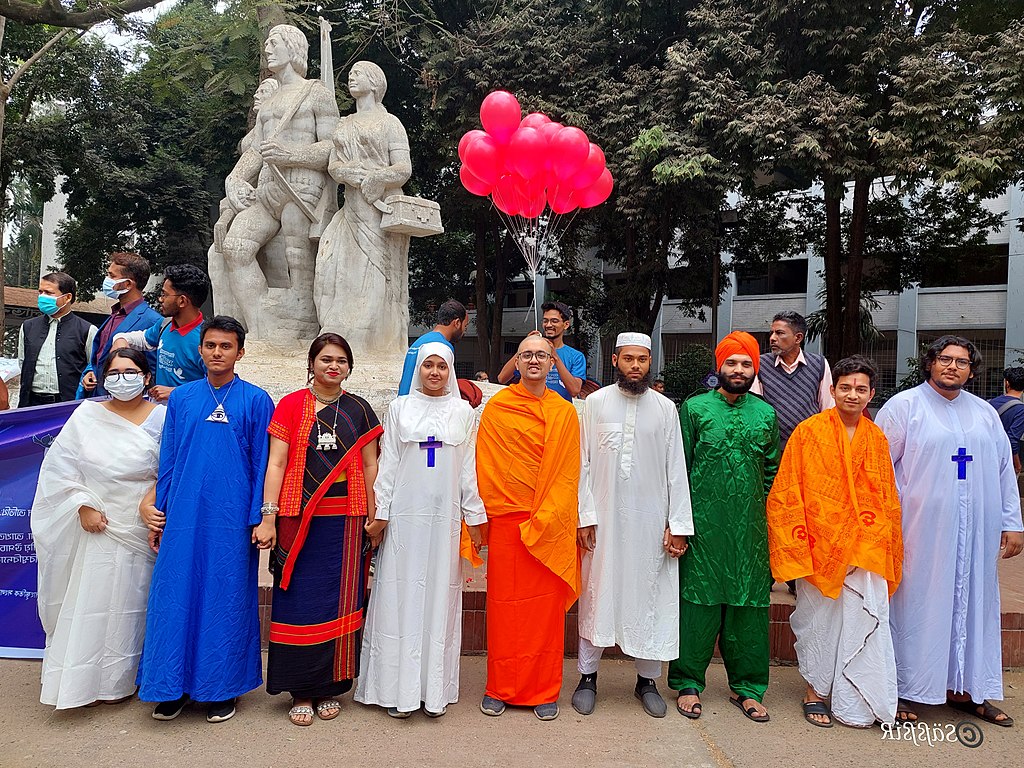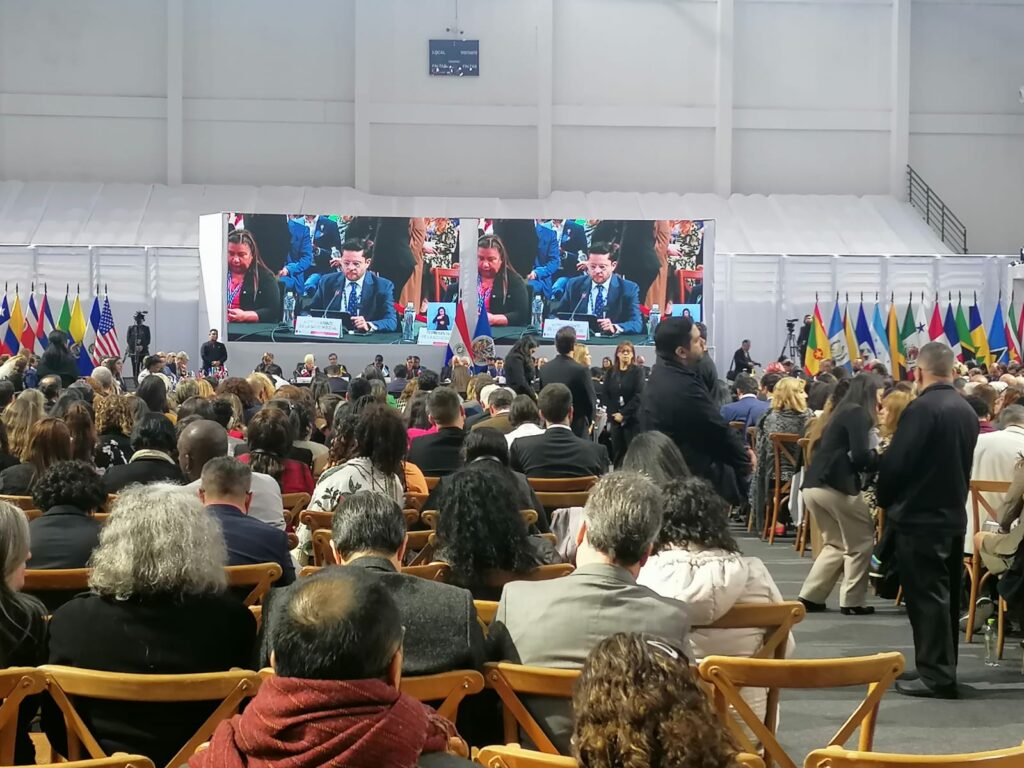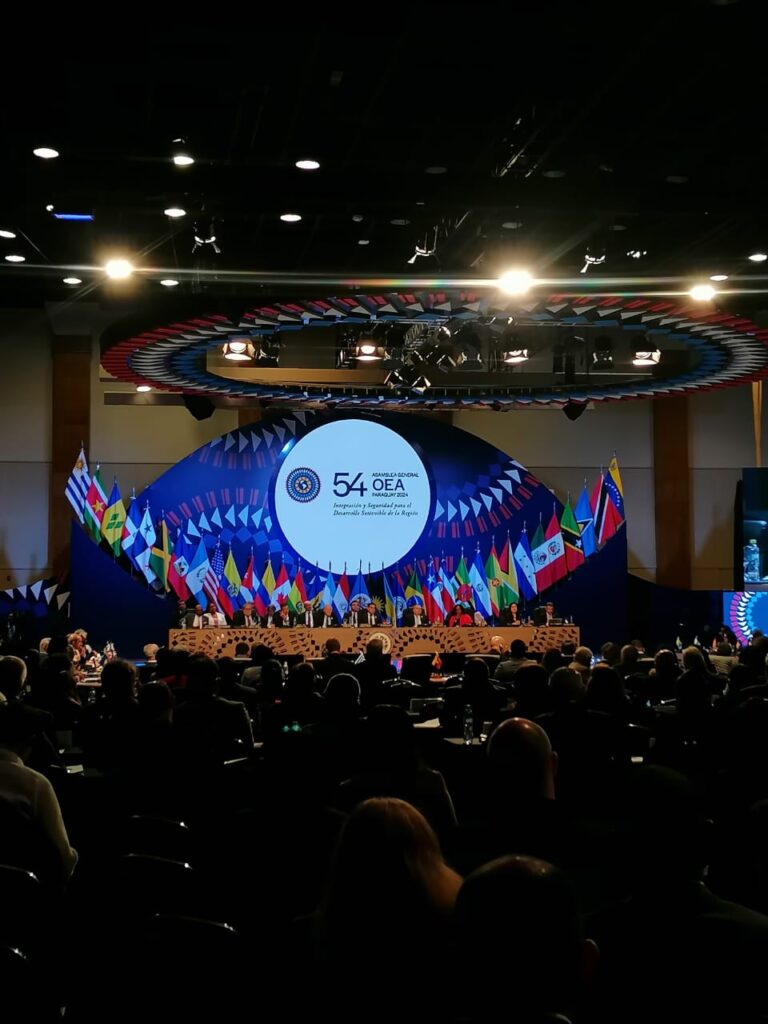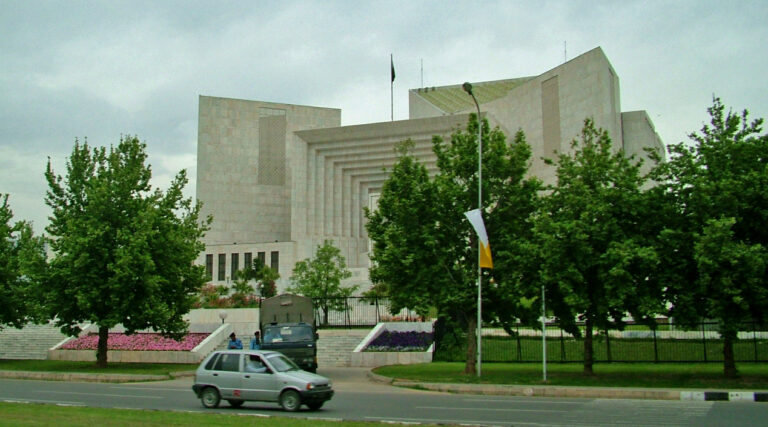
Religious Diplomacy in the Organization of American States: Challenges for the Promotion of Religious Freedom in the Americas
Marcela A. Bordón Lugo
Interfaith Harmony at the Department of World Religions and Culture by Monir Uddin Jowel (CC BY-SA 4.0)
The following essay is reprinted and adapted on Canopy Forum in collaboration with the journal Derecho en Sociedad, a biannual electronic publication that is free and open access. Their issue 18(2) features full length articles in Spanish and English. Read Lugo’s long-form essay on religious freedom in the Americas here.
In recent decades, religious communities and faith-based organizations have acquired a more visible role in civil society, participating in dialogue forums and international bodies such as the Organization of American States (OAS). This essay examines their presence and the challenges they face in achieving an adequate understanding by states and agencies of their contribution to social construction and the promotion of religious freedom. Religious organizations have become significant actors in international negotiations, influencing policies and the implementation of development and humanitarian aid programs. These organizations often focus on specific objectives like fighting hunger, protecting children, or providing disaster relief. However, their broader role in social development and promoting religious freedom remains under-discussed in some regions. However, there is ideological diversity among these organizations, which generates polarization on issues such as abortion, same-sex marriage, and sex education, ultimately affecting their ability to collaborate effectively.
An ethnographic investigation into the influence of these organizations in the OAS General Assembly reveals different strategies and actions applied by faith-based organizations. Despite their notable influence, they face significant challenges due to the lack of understanding and recognition of religious freedom as an integral right, exacerbated by ideological polarization and the fear of states addressing controversial issues.This essay examines their presence within the OAS and the challenges they face in ensuring states and the organization fully recognize their contributions to society.
Religious Organizations and New Actors
In academic forums, there are growing discussions about “new actors” in international negotiations, referring to groups that now play a more prominent role alongside states. Among these groups are religious communities and faith-based NGOs, which address issues like humanitarian work and human rights representing a wide range of perspectives. These organizations have gained increased influence in the 21st century, notably through the rise of the evangelical right in U.S. politics, the Catholic Church’s role in Eastern Europe’s democratization, and the impact of the Pentecostal Movement in Latin America. Their influence is evident in regions like the Middle East, where Islamic-influenced countries shape strategic negotiations in economic and security matters.
Religious Actors and Religious Diplomacy

Religious diplomacy involves integrating religious values and leaders into efforts to promote peace, justice, and reconciliation. There are different types of religious actors in international scenarios. First, religious communities, like the Vatican representing the Catholic Church, participate through their leaders in interfaith dialogues and international organizations. Religious diplomacy goes beyond peace talks, influencing policy and humanitarian aid, as seen in Pope Francis’ role in the 2014 U.S.-Cuba reconciliation.
On the other hand, we find those organizations called confessional, faith-based, or religiously inspired. Confessional organizations are entities with a specific religious identity, often comprising a social or moral component, with a wide international presence that offers opportunities for partnership and advocacy of fundamental rights. These organizations play a crucial role in development, democracy building, and security, as their moral and ethical frameworks often align with the promotion of human dignity and social justice.
Among the issues frequently addressed by these organizations, we can mention the fight against hunger, the protection of children, the fight against human trafficking, environmental protection, humanitarian assistance in disaster situations, the protection and promotion of women’s rights, among others. We can mention among them large confessional organizations, such as Caritas Internationalis, the World Evangelical Alliance, World Vision International, the Adventist Development and Relief Agency (ADRA), Islamic Relief, and the Hebrew Immigrant Aid Society, among others.
These organizations, with a long history of humanitarian and human rights work, have developed strategic alliances, not only with their peers as confessional organizations, but also with non-confessional or secular organizations that recognize the value of the work in the field carried out by religious communities through their various organizations. These alliances are possible thanks to the openness and dialogue among various actors. Over time, the professionalization of humanitarian work has become essential, moving beyond a reliance solely on volunteer-based efforts. This shift toward more structured organizational models fosters job stability and ensures the sustainable implementation of projects and plans.
Their motivation stems from religious principles, allowing them to build broad alliances. These organizations are influential in multilateral forums like the United Nations, where 320 faith-based organizations hold consultative status. Their impact is evident in initiatives like the creation of the UN Special Rapporteur on Freedom of Religion and the EU Guidelines for Religion or Belief.
Ideological Diversity in Confessional Organizations
The impact described results from dialogue and cooperation between religious communities and faith-based organizations within the international system. However, in recent decades, there has been increasing ideological diversity among these organizations, often more pronounced than between religious and secular entities. These faith-based organizations are generally categorized as either conservative or liberal, based on their doctrinal interpretations, leading them to align with similarly ideologically positioned groups, entities, and governments. This ideological divide has created a competitive environment among them, as they strive for greater influence in various forums.
Topics that Polarize Religious Discourse in Organizations
These ideological tendencies reflect the diversity within civil society and religious communities. However, certain issues, such as abortion, same-sex marriage, and sex education, create significant polarization among these organizations. While this essay does not question the existence of organizations with specific ideological stances, extreme polarization can hinder their ability to collaborate effectively in promoting religious freedom in the Americas. Maintaining constructive dialogue is crucial to overcoming these tensions.
Influence of Faith-Based Organizations at the OAS General Assembly

This section describes findings from ethnographic research on the advocacy practices of religious or faith-based organizations in the context of the OAS General Assembly. The research contrasts qualitative findings between actions and strategies applied by these organizations over a 10-year period, with a particular focus on the General Assemblies of 2014 and 2024, both held in Asunción, Paraguay.
On one hand, it is important to highlight that the religious actors and faith-based organizations that participate in these spaces have different ways of engaging in advocacy. For example, the presence of representatives from religious communities such as the Permanent Representation of the Holy See to the OAS, representing the Catholic Church, was observed, as well as representatives from religious communities like the Church of Jesus Christ of Latter-day Saints, the Jewish community, and even evangelical pastors from various denominations.
Most of these religious actors participate in dialogue spaces or as observers at the OAS General Assembly to maintain visibility before authorities of various organizations and states. Their involvement helps ensure that their voices are heard at high levels of decision-making. These actors focus their advocacy on promoting the importance of interreligious dialogue and religious freedom within these organizations and states. However, it is necessary to distinguish these religious actors, such as those who represent a religious institution per se, from faith-based organizations composed of believers, congregants, or even, in some cases, religious leaders who seek to influence specific issues, such as the defense of life from conception and the family, founded on the principles and values proposed by their religious beliefs. Most of these organizations are identified with a conservative ideology.
In the Latin American context, it is important to note that many of these organizations are composed of congregants from the Catholic Church or Evangelical Churches and are generally aligned with a conservative ideology. At the 2024 General Assembly, the presence of a minority of faith-based organizations that identify with a liberal or progressive ideology was observed, advocating in this case for the promotion and defense of religious freedom for religious minorities on the continent.
Among the conservative faith-based organizations, it is possible to identify organizations with extensive experience in international political advocacy, such as Alliance Defending Freedom and Human Life International. These two organizations are generally the ones who call on local and regional organizations to participate in the civil society dialogue space within the framework of the OAS General Assembly. The working methods of these organizations and their alliances include approaching representatives from each member country to share a statement that supports the conservative values of these organizations, asserting that they represent the majority of the people on the American continent.
Another way of engaging in advocacy is within the Civil Society Dialogue space with representatives from the member countries. This is a session where a representative from each coalition previously registered with the General Secretariat has a time slot to present the issues their organizations believe member countries should prioritize. This is a space where the same dynamic of participation is observed in both the 2014 and 2024 General Assemblies, in which there is an effort to form as many coalitions as possible with the aim of, in a sort of competition, demonstrating that the largest number of coalitions present the most important issues for the region.
In this competitive environment, pro-life and pro-family organizations not only lead the conversation within civil society, but organizations advocating for LGBTIQ rights and sexual and reproductive rights also strive to assert their influence, each presenting its own perspective.In this competitive dynamic, not only do pro-life and pro-family organizations dominate the dialogue table with civil society, but organizations aligned with LGBTIQ rights and sexual and reproductive rights also seek to dominate the same space, each with its own discourse. In practice, this proves counterproductive, given that by monopolizing the only dialogue space with delegations from the majority of countries in the region, other issues such as strategic security or the erosion of democracy are overshadowed by the sheer number of coalitions from both sides seeking to occupy the space for their respective causes.
Another form of advocacy employed by these organizations is the use of media to organize mass walks or deliver messages in favor of the traditional values they represent. This strategy has shown a marked decline in effectiveness, as evidenced by a noticeable drop in the ability to mobilize, both for conservative and progressive organizations, demonstrating a pronounced lack of interest from society in addressing these highly controversial issues that dominate the media and political advocacy spaces. Finally, the most effective form of advocacy at the local level, where national organizations can achieve greater impact is political lobbying with the host government of the OAS General Assembly. Generally, the expression of widespread rejection by the population regarding issues like decriminalization of abortion creates fear among the authorities of being associated with controversial topics that could jeopardize the government’s popularity or approval.
While this form of political pressure can be considered effective, it brings with it other implications, such as the willingness of some of these organizations or religious communities to praise certain governments for their positions in favor of protecting life from conception or traditional values while ignoring or overlooking various situations that may affect a country in the region, such as the weakening of democracy, the presence of organized crime, and corruption.
The Right to Religious Freedom in the Inter-American System
The right to religious freedom is a fundamental right protected by the Inter-American Human Rights System. This protection is outlined in Article 12 of the American Convention on Human Rights (ACHR). This right includes the freedom to maintain, change, and publicly or privately profess and disseminate one’s religion.
The Inter-American Commission on Human Rights (IACHR) and the Inter-American Court of Human Rights have developed jurisprudence on religious freedom, emphasizing its importance for human dignity, pluralism, and tolerance in democratic societies. A notable case is Pueblo Bello vs. Colombia, where the IACHR underscored the state’s obligation to protect the religious freedom of victims of forced displacement due to their religious affiliation.
Despite protections, religious communities in the region still face restrictions, discrimination, and persecution due to state policies, social intolerance, or extremist violence. The IACHR’s 2024 report, “Inter-American Standards on Freedom of Religion and Belief” highlights the need to protect religious freedom without discrimination. However, the report has been criticized by the Observatory of Religious Freedom in Latin America (OLIRE) for inaccuracies and omissions, particularly in addressing issues affecting religious minorities in the region.
Challenges for Promoting Religious Freedom in the Americas
The political advocacy of conservative faith-based organizations is significant on the international stage but has proven detrimental to promoting religious freedom in the Americas, especially in Latin America. Religion plays a crucial societal role, yet discussing it in politics has become controversial due to the rise of secularism and a lack of interreligious dialogue, leading to rejection among different faiths when authorities express their beliefs.
Pro-life and pro-family organizations use religious discourse to influence authorities, fostering a fear of addressing contentious issues like abortion and same-sex marriage. Even in conservative countries, discussing religion as a component of public policy remains difficult. While governments and international organizations acknowledge the importance of religious communities, they often sidestep religious discussions to avoid social polarization. These organizations contend that their objectives are not solely rooted in religious values; however, they strategically connect their cause to the strong religious identity of the nation. For instance, they highlight the predominant influence of Catholicism and Evangelicalism in the region, arguing that opposing their causes could equate to challenging national identity or the values of the people. Although they may frame their arguments from a social perspective, the religious element is often leveraged to bolster their position. Pro-life and pro-family organizations use religious discourse to influence authorities, creating a fear of addressing issues like abortion or same-sex marriage. Even in conservative countries, discussing religion as public policy remains challenging. While governments and international organizations recognize the value of religious communities, they avoid discussing religion to prevent social polarization.
This polarization has led to a rejection of religion by some states and organizations, resulting in a lack of understanding and violations of religious freedom. The main challenge is the lack of religious literacy, which prevents states and organizations from effectively engaging with religious groups. They must distinguish between polarizing faith-based organizations and those that contribute positively to society, finding strategic allies among religious communities that operate where the state does not.
Conclusion
Promoting religious freedom in the Americas requires a deep understanding of its multidimensionality and a clear distinction between polarizing issues and the valuable contributions of religious organizations. Religious communities and faith-based organizations play fundamental roles in social construction, offering significant contributions in areas such as humanitarian work, the protection of human rights, and sustainable development. However, their efforts are often overshadowed by polarizing debates that do not reflect the entirety of their efforts and achievements.
To advance the promotion of religious freedom, it is essential for states and international organizations to acquire adequate religious literacy, enabling them to recognize and engage in effective and respectful dialogue with various religious denominations. This literacy will facilitate the differentiation between organizations that focus on divisive issues and those that make positive and tangible contributions to society.
Furthermore, it is crucial for governments and international organizations to establish strategic relationships with religious actors who promote health, child protection, human rights, and security. By recognizing and highlighting these contributions, it will be possible to overcome fear and polarization, paving the way for constructive collaboration that strengthens religious freedom and, ultimately, the cohesion and well-being of societies in the region.
Promoting religious freedom not only involves protecting the right to belief and worship but also valuing and supporting the positive role that religious organizations play in building more just, peaceful, and resilient communities. In doing so, it will be possible to move towards a society where religious diversity is recognized and appreciated as a source of wealth and strength that drives the comprehensive development of all nations on the continent. ♦

Marcela A. Bordón Lugo Marcela Bordón is a Program Officer and Research Associate at the International Institute for Religious Freedom, focusing on citizen participation, human rights, and religious freedom issues. Born in Asunción, Paraguay, and currently residing in Santiago, Chile, she holds a law degree from the National University of Asunción and a Master’s in Political Science with a major in International Relations from the Pontifical Catholic University of Chile.
Recommended Citation
Bordón, Marcela. “Religious Diplomacy in the Organization of American States: Challenges for the Promotion of Religious Freedom in the Americas.” Canopy Forum, November 15, 2024. https://canopyforum.org/2024/11/15/religious-diplomacy-in-the-organization-of-american-states-challenges-for-the-promotion-of-religious-freedom-in-the-americas/.
Recent Posts










